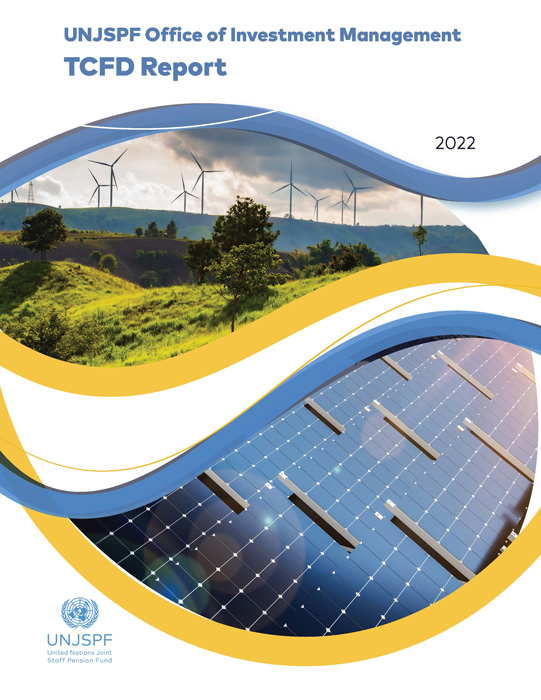The UN Pension Fund released today its 2022 climate finance disclosure report, providing an update on the progress achieved in furthering climate considerations on its investment activities. The report highlights its climate commitments, which are an integral part of the Fund’s sustainable investment approach.
The publication of this report follows the recommendations made by the Task Force on Climate-Related Financial Disclosures (TCFD), designed to help companies provide better information to support informed capital allocation.
“The UNJSPF is taking proactive actions to evaluate and act on climate change. In this report, we want to transparently disclose how the Fund is aligning its strategies with the recommendations received by TCFD. We want to reaffirm our responsibility to integrate climate-related risks and opportunities into all of our investment processes”, said Pedro Guazo, Representative of the Secretary-General for the investment of the UNJSPF assets.
The report confirms that the Fund’s Office of Investment Management (OIM) follows a well-structured channel of oversight on climate-related decisions. To double down on its efforts to integrate climate analysis over the short, medium and long term, the Fund included climate considerations into its 2023 Asset-Liability Management (ALM) study, considering both climate physical and transition risks and assessing the Fund’s resilience according to different climate scenarios.
OIM committed to net zero carbon emissions by 2050 and the transition to a low carbon economy, as the Fund believes it is essential to limit global warming to 1.5°C, in line with the Paris Agreement. In its net zero strategy, OIM set targets across three pillars:
- Carbon reduction targets. The Fund has set a 40 per cent absolute reduction target for its public equities, corporate bonds and real estate equity funds portfolios by 2025 compared to 2019 levels, following the guidance of the Net-Zero Asset Owner Alliance. In 2022, the Fund already achieved a 39 per cent reduction. This was achieved through divestment from fossil fuels and engagement with portfolio companies.
- Engagement targets. Over recent years, OIM has placed its focus on climate change issues, particularly on high emitting companies. In 2022, 72 per cent of environmental engagements were related to climate change.
- Financing the transition targets. The Fund’s objective is to identify and invest in companies that are most effectively managing transition risks and are well positioned for the long term. Using a proprietary model, OIM monitors its current exposure to this theme and identifies, within the fossil fuel industry (as quantified by revenues), companies that are already transitioning their business models.
Methodologies
OIM uses in-house methodologies and third parties to identify risks and uses divestment, engagement, and investment in transitioning companies to manage climate risks and take advantage of climate opportunities.
Every four years, the Fund undertakes an Assets-Liabilities Management (ALM) study using an expert, external consultancy firm. The goal of the 2023, ALM study was to assess the impact of key investment and solvency-related decisions on the long-term financial condition and performance of the Fund and to recommend strategic asset allocations that would improve the long-term financial outlook of the Fund.
The 2023 ALM study fully integrates climate risk in its modelling to help OIM understand climate risks and opportunities and make informed decisions.
Background
The Financial Stability Board established the Task Force on Climate-Related Financial Disclosures in 2017 to develop recommendations for more effective climate-related disclosures that could promote more informed investment, credit, and insurance underwriting decisions and, in turn, enable stakeholders to understand better the concentrations of carbon-related assets in the financial sector and the financial system’s exposures to climate-related risks. The TCFD recommends documenting the processes to communicate to relevant parties the key inputs, assumptions, analytical methods, outputs, and potential management responses.
The UNJSPF provides retirement, death, disability and related benefits to over 215,000 staff, retirees and beneficiaries from the United Nations and other international member organizations. OIM is responsible for the investment management activities of the Fund, overseeing over $80 billion of assets (value in September 2023). The fiduciary duty to manage the assets of the Fund in the best long-term interest of its participants and beneficiaries encompasses a strong commitment to sustainable investing.
To read the 2022 report, click here.



